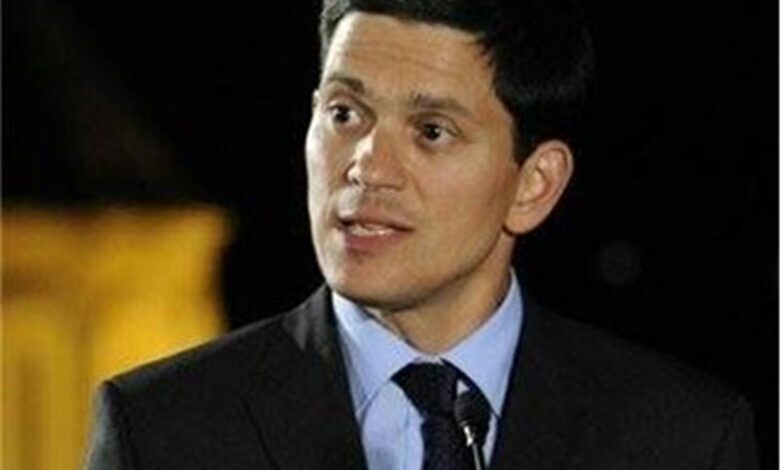Miliband’s account of the disastrous and painful situation in the Gaza Strip

| The former British foreign minister and the executive director of the International Rescue Committee, whose team was present in the region for a long time to help the people of the Gaza Strip, spoke about the brutality of the war in its most painful form in this region. |
According to the international group Tasnim news agency, David Miliband, former British foreign minister and executive director The International Rescue Committee, whose organization was in the Gaza Strip with several doctors to help in the middle of January, discussed the disastrous conditions in the Gaza Strip in a conversation with the German magazine Die Sight and stated: We were in the Gaza Strip with two teams, in Al-Aqsa Hospital. In the center and in the Nasser hospital in the south, which is now in the news. Our doctors are international medical specialists who have operated on site and treated the most urgent emergency cases. Most of our doctors are experienced, they know what they are doing, nothing can upset them so easily – and yet what they saw in the Gaza Strip shocked them deeply.
In another part of this conversation, he stated: What our teams experienced in the Gaza Strip is shocking in its brutality. Our doctors tried to save the lives of one-year-old babies who had lost their arms and legs and were brought there with terrible skin burns. Our doctors took the hands of a 70-year-old who was dying and could no longer give him medical help. These are all the first-hand accounts of eyewitnesses.
David Miliband went on to say: Sometimes our doctors stayed a night in the hospital, but mostly in our own guest house, which was free due to its proximity to other buildings. We were choosing However, the residence was hit by a 1,000-pound bomb in January. The bomb landed on one side of the house. Our employees owe their lives to the fact that the bomb fell two meters ahead, otherwise our employees would be dead by now. The GBU32 bomb landed in the sand, which reduced the detonation pressure. The house was destroyed and three of our employees were injured.
He further said: Our teams have seen how devastated Gaza is. 85% of the buildings have been completely or partially destroyed. One and a half to two million people are displaced. But statistics can hardly reflect the real situation. What concerns me is the number of bodies buried under the rubble that have yet to be found. This brutality is a war in its most painful state.
He further said about the biggest challenge currently in the Gaza Strip: the immediate danger to the lives and lives of people always in battle and on the front is that, for example, in five The next minute he dies. But those who are not affected by the war are affected by the food crisis. We are a humanitarian organization, we can only describe the situation and conclude what should be done from a humanitarian perspective. There are two categories of this humanitarian obligation: providing aid and protecting human life. The only way to do this is to stop all conflicts.
He went on to say about the consequences of the Zionist regime’s possible attack on Rafah in the south of the Gaza Strip: In this case, the lives of 1.5 million people would be at risk. Placed. Who will survive is a matter of luck. We are talking about people huddled together in very small spaces, who have already been displaced four or five times in this conflict, and in many cases have lost family or friends. In addition to the 28,000 or 29,000 dead, an estimated 60,000 to 70,000 were injured. When fighting in such densely populated areas, the risk is very, very high. Sometimes you don’t have the words to understand what it means.
The former British foreign minister went on to say: The Gaza Strip is not the only place where warring parties face the challenge of pursuing their war goals while protecting the rights of civilians. are. But international law is clear. These rights provide absolute protection of human life and the right to assistance. When it comes to proportionality, it’s not what the other person has done to you, but what you’ve done yourself to meet humanitarian needs. The Geneva Convention, which describes these requirements, is the result of the horrors of the past centuries. On our list of the 20 countries most at risk for human rights, Gaza is second only to Sudan, where 25 million people are currently in need of assistance. Assessing Gaza as deadly and dangerous for its residents, he said about the accusations against UNRWA and the request of the Zionist regime to expel this aid organization from the Gaza Strip: If 2.2 million Palestinians in Gaza and three million others in other places are aided by UNRWA If they don’t, no one will help them. No one can take over this task tomorrow. There is no replacement for UNRWA in the foreseeable future.
Miliband went on to say: We are currently preparing our third emergency team of doctors to return to Gaza. Humanitarian necessity requires us to go to very, very dangerous places.
end of message/
| Publisher | Tasnim News |


